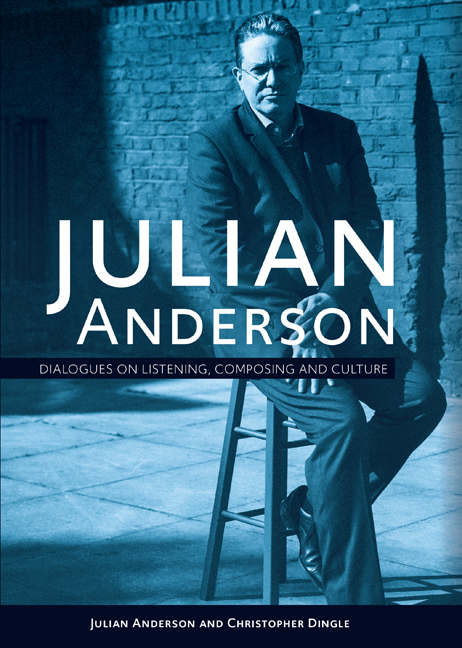Book contents
- Frontmatter
- Contents
- List of Illustrations
- Foreword
- Acknowledgements
- Introduction
- Prelude – Jeux: A Conversation Over Lunch
- Conversation One Origins
- Conversation Two Enthusiasms
- Conversation Three Training
- Conversation Four Dance
- Conversation Five Folk
- Conversation Six Composing (or Not)
- Conversation Seven Understandings
- Conversation Eight Beginnings (and Endings)
- Conversation Nine Puzzles
- Conversation Ten Singing
- Conversation Eleven Olly
- Conversation Twelve Memory
- Conversation Thirteen Opera
- Conversation Fourteen Practices
- Conversation Fifteen Outsiders?
- Conversation Sixteen Quartets
- Conversation Seventeen Advocacy
- Conversation Eighteen Partnerships
- Coda: Multiple Choices
- Chronology
- List of Personae
- Glossary of Musical Terms
- Macrotonality
- Catalogue of Published Works by Julian Anderson
- List of Recordings of Julian Anderson’s Music
- Bibliography
- Discography
- Index
Conversation Ten - Singing
Published online by Cambridge University Press: 16 September 2020
- Frontmatter
- Contents
- List of Illustrations
- Foreword
- Acknowledgements
- Introduction
- Prelude – Jeux: A Conversation Over Lunch
- Conversation One Origins
- Conversation Two Enthusiasms
- Conversation Three Training
- Conversation Four Dance
- Conversation Five Folk
- Conversation Six Composing (or Not)
- Conversation Seven Understandings
- Conversation Eight Beginnings (and Endings)
- Conversation Nine Puzzles
- Conversation Ten Singing
- Conversation Eleven Olly
- Conversation Twelve Memory
- Conversation Thirteen Opera
- Conversation Fourteen Practices
- Conversation Fifteen Outsiders?
- Conversation Sixteen Quartets
- Conversation Seventeen Advocacy
- Conversation Eighteen Partnerships
- Coda: Multiple Choices
- Chronology
- List of Personae
- Glossary of Musical Terms
- Macrotonality
- Catalogue of Published Works by Julian Anderson
- List of Recordings of Julian Anderson’s Music
- Bibliography
- Discography
- Index
Summary
Unsurprisingly, this is a conversation about Anderson's writing for the human voice. It charts his experience as a member of the London Philharmonic Choir, which he joined when he was starting work on Heaven is Shy of Earth. Some of the influences on that oratorio are noted, before discussion of Four American Choruses prompts consideration of the combination of unpredictability and control in ‘Beautiful Valley of Eden’. Heaven is Shy of Earth is explored at some length, including some thoughts on the text of the Mass, while a discarded sketch is revealed as the source for part of Alleluia. The Bell Mass, written for Westminster Abbey, causes the conversation to take an unexpected turn, with observations on Pope John Paul II's visit to Britain in 1982 and the impact of Vatican II on music, before exploring the work itself.
CD: We spoke elsewhere about you being primarily an orchestral composer, and aside from ensemble pieces, anyone looking at your output at the start of the new millennium would have placed you clearly as an orchestral composer. However, the 2000s saw the voice come to the fore, notably choral voices. This is presumably related to you joining the London Philharmonic Choir.
JA: Yes. As I said before, I was asked to write a piece for the 2006 Proms on a large scale. I had two ideas. One was for a sort of masque – it was another version of the idea I’d had since 1999 to set The Tempest. This would have been done in the round using the whole of the Royal Albert Hall space, with singers and instruments everywhere in the building, lasting about an hour. The other idea was for an oratorio, which would use Emily Dickinson and parts of the Latin Mass and other related texts. The BBC chose the oratorio, which became Heaven is Shy of Earth.
I’d already made a setting of Dickinson in a work for the Cheltenham Festival in 1995 for baritone, violin and piano, a slightly odd combination, called I’m nobody, who are you? I’d been keen on her poetry since reading a fascinating article on her by Robert Craft. What I find intriguing about people like Dickinson and Hölderlin is their status of being outside or very marginalised by the society of their time.
- Type
- Chapter
- Information
- Julian AndersonDialogues on Listening, Composing and Culture, pp. 186 - 212Publisher: Boydell & BrewerPrint publication year: 2020

